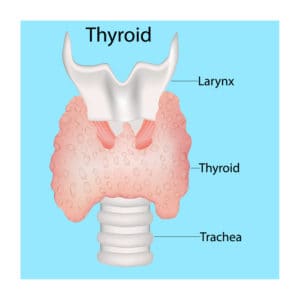What Do Endocrine Disruptors Do ?
The Endocrine System
The human body system is a structure composed of the functioning of diverse parts that are all interrelated. It’s important to overall health that these diverse parts work together in concert.
This also applies to the hormones in the human body system – they interact within your body to carry out vital and complex processes that are important for the reproduction and survival of humans.
The endocrine system is one of the major systems that control and influence human body function.
The endocrine system is made up of organs known as glands that produce and secrete hormones, acting as chemical messengers that play a significant role in the regulation of cellular activity and overall body function.
 Some functions these hormone control include:
Some functions these hormone control include:
- Growth processes
- Metabolism
- Sensory perception
- Respiration
- Sexual development
- Reproduction
When these chemical messengers or hormones are produced, they are transported to various tissues of the body, transferring information from one area to another in order to coordinate the functioning of the different parts of the body.
The major glands of the endocrine system are:
- The Pituitary gland
- The Pancreas
- The Hypothalamus
- The Adrenal glands
- The Thyroid gland
- The reproductive glands (which includes the testes and ovaries), and the pineal body.

Located at the base of the brain, the pituitary gland is known as the ‘master gland’ as it influences the activities of several endocrine glands. The adrenal glands are known as the glands of emergency due to their ability to help the body respond during an emergency situation. Learn more about how the adrenal glands function.
However, it is possible for the endocrine system to experience disruption to its smooth operation. A few factors can affect the health of the system, causing difficulties in its function. This alteration in the endocrine system is known as endocrine disruption and can have far-reaching adverse effects on the smooth working of your entire body.
What Are Endocrine Disruptors?
Endocrine disruptors are exogenous chemicals or substances that interfere with the functioning of the body’s endocrine system, causing adverse health conditions that impact the body’s reproductive, neurological, developmental systems and also impact the immune system.
Endocrine disruption is caused by a variety of substances, both man-made and natural, including poly chlorinated biphenyls, DDT (and other pesticides), pharmaceuticals, dioxins, and plasticizers like Bisphenol A (BPA)
 Endocrine disrupting chemicals like BPA can be found in everyday products such as the lining of metal food cans, cosmetics, plastic bottles, detergents, pesticides, flame retardants and toys. Find information about how to avoid exposure to these chemicals in your home.
Endocrine disrupting chemicals like BPA can be found in everyday products such as the lining of metal food cans, cosmetics, plastic bottles, detergents, pesticides, flame retardants and toys. Find information about how to avoid exposure to these chemicals in your home.
In addition concern exists about the cumulative effect of the various endocrine disruptors, not simply the single effect of each. The adverse effects caused by endocrine disruptors is a major cause of public health concern.
Clinical research has revealed that endocrine disruptors may have even more significant effect on prenatal and early postnatal development as the organs and neural systems are at their initial stages of formation.
What Do Endocrine Disruptors Do?
Research has shown the mechanism of endocrine disruptors and how they interfere with hormonal functions.
• Endocrine disruptors can mimic hormones such as thyroid hormones, androgens (male sex hormone), and estrogens (female sex hormone), either partially or fully.
• They can interfere with the way in which natural hormones or their receptors are produced or controlled. One way they achieve this is by altering the metabolism of these hormones in the liver.
• Endocrine receptors can bind to a receptor inside a cell, preventing the binding of natural endogenous hormones. This block prevents the transmission of signals within the cell and makes it impossible for the body to respond properly to situations. Anti-androgens and anti-estrogens are examples of endocrine disruptors that block hormones.
Effects of Hormone Disruptors on Adrenal and Thyroid Glands
Chronic Fatigue syndrome sufferers should understand the effect of this disruption on the adrenal and thyroid glands as this can contribute to the overall fatigue symptoms experienced. It is therefore important to avoid exposure to as many of these hormone disrupting chemicals as possible.
Thyroid Gland
 Thyroid hormone plays a significant role in the body’s physiological processes, ranging from metabolism, cell differentiation and growth.
Thyroid hormone plays a significant role in the body’s physiological processes, ranging from metabolism, cell differentiation and growth.
However, endocrine disruptors are known to interact with the elements that make up thyroid hormone homeostasis such as synthesis, the uptake of thyroid hormone and its metabolism within the cells. Receptor binding and the storage and release of thyroid hormone from the thyroid gland can also be disrupted.
In particular, exposure to PCBs, phthalates and UV filters are suspected to be thyroid disruptors. These disruptors have the potential to alter inter cellular organization and regulation of the body’s adaptive processes.
Adrenal Glands
The adrenal glands located at the top of your kidneys play a very important role in the body, secreting chemical messengers or signals into the bloodstream in order to carry out coordinated functions.
However, the adrenal glands can sometimes function abnormally. For instance, they may not be producing enough hormones or they may be excessively producing the stress hormone cortisol as a result of ongoing stress and/or disruption from chemicals.
There are a wide variety of chemicals that can disrupt adrenal function and affect the body’s physiological processes.These endocrine disruptors mimic adrenal structure and function, exposing the adrenals to the risk of toxic attack.
Why Should You Be Concerned About Endocrine Disruptors?
Chemicals such as DDT (Dichlorodiphenyltrichloroethane) and BPA (bisphenol A) are endocrine disruptors. It has been reported that the chemical BPA is used in baby feeding bottles and how this may pose developmental problems to those babies.
In addition to being linked to medical conditions such as neurological problems, disorders of the male and female reproductive system, diabetes, thyroid and immune disorders, obesity, hormone-related cancer, and osteoporosis, questions still remain.
What are the cumulative effects of Endocrine Disrupting Compounds (EDCs) in combination?
How many other EDCs are there that we don’t already know about?
Whilst science has already exposed some of the health risks posed by Endocrine Disrupting Compounds (EDCs), providing answers to these questions requires further research.
Studies have shown that even low doses of EDCs can threaten your health and the functioning of other biological systems. Endocrine disruptors can remain in your body system, causing cumulative effects over the course of a lifetime.
Some studies have even revealed that EDCs can even be passed from parent to offspring. Yet only very few regulations are in place to check the manufacturing and usage of EDCs, unlike other harmful substances such as asbestos and tobacco.
Only on rare occasions are companies required to provide manufacturing data to the government to assess presence of specific substances like EDCs. And even when these tests are carried out, the available information revealing the presence and effects of EDCs are often limited. With a regulatory lag in testing processes, there is indeed a cause for concern.
Avoiding Exposure To Hormone Disruptors
You now know that EDCs are hormone-mimicking compounds that can alter your body’s normal hormonal processes and wreak havoc on its function. In fact, these hormone disruptors are all around us, in your personal care products, perfume, household cleaners, plastic toys, household dust, laundry, and even food.
Completely escaping exposure to EDCs can be difficult, but there are ways to significantly minimize your exposure.
Go Plastic-free
 Plastics are everywhere, from containers for your conditioner, wrapping the food you eat, or encasing your phone – and some of these plastics contain hormone disruptors. While it may be impossible to eliminate all plastic, you can take steps to minimize its use.
Plastics are everywhere, from containers for your conditioner, wrapping the food you eat, or encasing your phone – and some of these plastics contain hormone disruptors. While it may be impossible to eliminate all plastic, you can take steps to minimize its use.
Rather than using plastics for your food storage, go for glass containers. Whatever the case, always look out for safer alternatives to plastics whenever you go shopping.
Buy Organic

By eating organic foods, you will be protecting yourself from pesticides and herbicides that have been linked to hormone disruption. If possible, shop from local farmers so you can find out details about their food production methods.
Drink Filtered Water
 Drinking filtered water is a great way to reduce exposure to BPA and other potential hormone disruptors. You could access clean, filtered drinking water by running water from a tap attached to a certified water filter. Reducing the use of plastic water bottles is also crucial. Read about a great, healthy alternative to plastic water bottles.
Drinking filtered water is a great way to reduce exposure to BPA and other potential hormone disruptors. You could access clean, filtered drinking water by running water from a tap attached to a certified water filter. Reducing the use of plastic water bottles is also crucial. Read about a great, healthy alternative to plastic water bottles.
You can also reduce exposure to endocrine disruptors when you bathe by installing a filtration system to your shower head.
Rethink Skincare Products and Fragrances

Many beauty products contain hormone disruptors such as phthalates and parabens and when applied, they are absorbed by your skin. Check the labels of your skincare products, avoid those that contain chemicals and go for only natural, organic products.
Phthalates are also predominant in fragrances.
Interestingly, fragrances are not necessary for a product to deliver top results. Go for fragrance-free detergents, creams, and cleaning products. Always check product labels to look out for the presence of fragrance as it can show up just anywhere, whether in your garbage bag or your baby diapers.
Clean Smart

The importance of washing your hands cannot be overemphasized and should always be done before eating. In addition, it is also very important to clean your household products as frequently as possible. Flame retardants are used in the manufacture of baby products, electronics and sofas. Chemicals escape from these products and collect in dust.
If you cannot afford to replace these items with products that are flame-retardant free, you can reduce exposure to endocrine disruptors by dusting your home items with a damp cloth, and by using a vacuum and HEPA filter.
While you want to ensure your home feels fresh and smells great, you do not want to introduce air pollutants into your home. Many people do this unknowingly by purchasing ‘cleaning’ products that contain harsh chemicals.
Since companies are not required to list the ingredients on their label, you can ensure your safety by buying cleaning products from companies that release this information voluntarily.
Putting It All Together
Avoid endocrine disrupting chemicals as much as possible by using some of the tips mentioned in this article to safeguard the health of your adrenal and thyroid glands as well as overall health.
Please feel free to leave a comment below.




